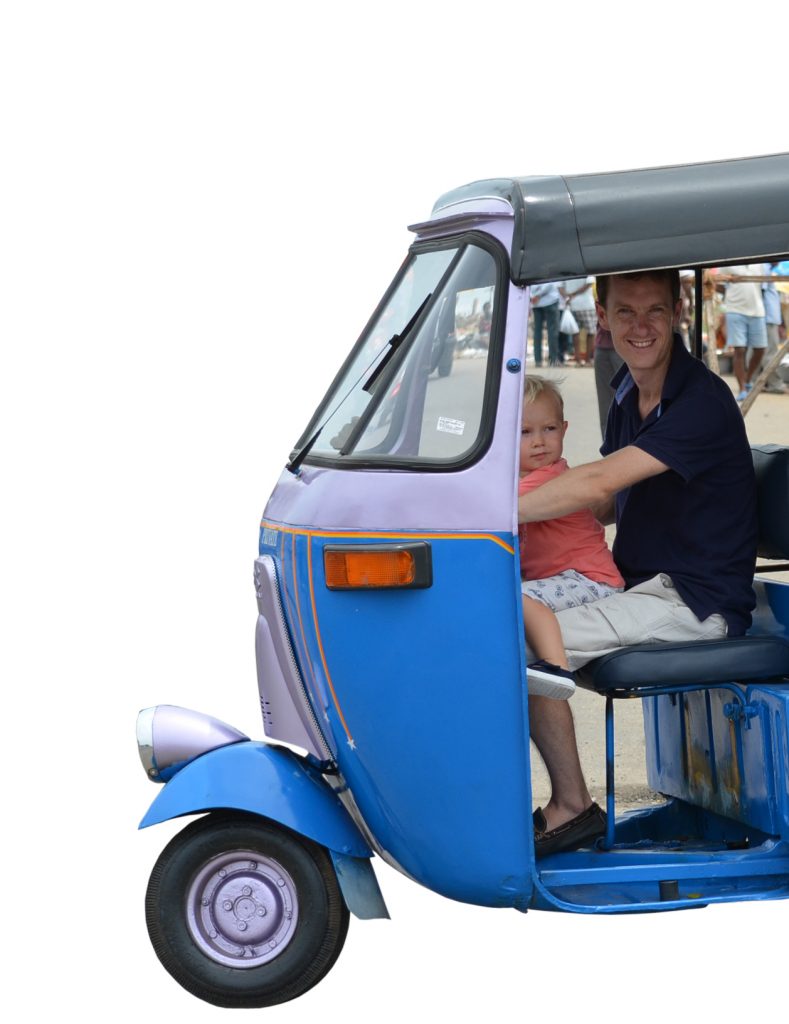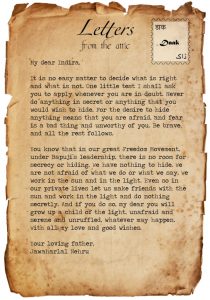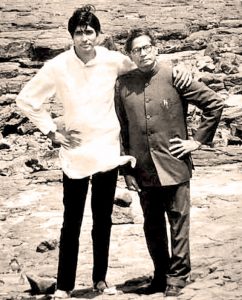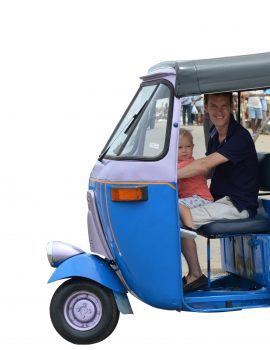Fathers are often seen as guides and mentors who help their children forge their path, and hold  a light up for them when starting out. Fathers are often their children’s biggest supporters and stern critics, too. On the occasion of Father’s Day, we look back at some of the legacies created by men who were legends in their own right, and better examples as fathers
a light up for them when starting out. Fathers are often their children’s biggest supporters and stern critics, too. On the occasion of Father’s Day, we look back at some of the legacies created by men who were legends in their own right, and better examples as fathers
Fathers play a crucial role in their children’s lives. They are often the first, and primary, disciplinarians in our lives; teachers in younger days and mentors in later yea
rs. An interesting point of view that is often brought up when fathers are discussed is the fact that they tend to set very high expectations for their children – almost as if they know deep within their children’s true potential and wait for the day when the latter would have achieved it. As American lawyer and politician Fra
nk Clark said, “A father is a man who expects his son to be as good a man as he meant to be.” In line with Father’s Day (June 19), we celebrate and honour fathers worldwide. As a tribute, we look at some Indian fathers who not only set the bar high but also raised their children to be a shining example of the best in work and values.
Jawarhalal Nehru
India’s first Prime Minister; father of Indira Gandhi, India’s first lady
Prime Minister
The first Prime Minister of India shared a deep bond with his daughter, Indira (née Indira Gandhi, who later became Indira’s first lady Prime Minister), and was determined to give her a well-rounded education. Undaunted by

his frequent sojourns to prison, he began to write her letters in which he shared life lessons, wisdom gleaned from books and words of advice about how to tread in the world at large. In his first letter,  which he began writing in the summer of 1928, Nehru talked about how life began in the universe. In the following letters, he touched on several topics, including languages, trade, history, geography, science, epics and evolution. In return, Indira shared her own thoughts, and the duo traded their view
which he began writing in the summer of 1928, Nehru talked about how life began in the universe. In the following letters, he touched on several topics, including languages, trade, history, geography, science, epics and evolution. In return, Indira shared her own thoughts, and the duo traded their view
s and recommendations on books.
The writings strengthened the bond between father and daughter, and – more importantly – awakened in Indira a sense of responsibility and kinship towards people and the environment. In 1973, Indira wrote, “These letters aroused a feeling of concern for people and interest in the world around me. They taught one to treat nature as a book. I spent absorbing hours studying stones and plants, the lives of insects and at night, the stars.”
Apart from lessons on the world around them, Nehru also shared his thoughts on what made for a responsible leader. In a letter written to her in 1932, he says, “It is no easy matter to decide what is right and what is not. One little test I shall ask you to apply whenever you are in doubt. Never do anything in secret or anything that you would wish to hide. For the desire to hide anything means that you are afraid, and fear is a bad thing and unworthy of you. Be brave, and all the rest follows.”
Nehru’s correspondence was later compiled into a book titled Letters from a Father to His Daughter. In it, one senses his desire to mould his daughter as a worthy citizen, a well-rounded scholar and a good human being.
Maharishi Debendranath Tagore
Founder of Brahmo Samaj; father of poet Rabindranath Tagore
Debendranath Tagore (or Thakur), was a Hindu philosopher and an active member of the Brahmo Samaj, which took up the cause  of social and religious reform
of social and religious reform

. Tagore was born into a wealthy landowning family, and introduced to power and privilege from childhood. However, at a young age, he developed a deeply religious outlook, a development that had its roots in a night spent beside his grandmother’s deathbed, and from reading a page of
the Ishopanishad.
Influenced by his friend and social reformer Ram Mohan Roy, Debendranath founded the Tattwaranjini Sabha (later renamed Tattwabodhini Sabha; it lasted until 1854) to promote the ‘purification’ of Hinduism through the dissemination through philosophical enquiry and teaching of the Upanishads. He also started a journal, Tattwabodhini Patrika, that published articles on the rationalisation of Brahmo doctrines and the propagation of natural theism as well as on female education, widow re-marriage and the denouncing of polygamy.
In December 1843, Debendranath converted the society into Brahmo Samaj, a spiritual fraternity that came together regularly for praise and prayer. For his efforts at religious and social reform, he was known as Maharishi or ‘great soul’. He
also founded Shantiniketan in the 1860s, wherein Rabindranath would establish his school and university many years later. Debendranath’s involvement in the Bengal Renaissance had a strong effect on his family – especially his son, Rabindranath Tagore, who would become one of India’s beloved poets and writers. Even though Debendranath did not spend much time at home, his work enabled his family to be a part of the larger cultural movement. Rabindranath has also written about accompanying his father on one of his journeys – first to Shantiniketan and then to the Himalayas – and described it as a “life-changing experience”. He credits his father with teaching him discipline as well as freedom and responsibility, and for acquainting him with the Upanishads.
Harivansh Rai Bachchan
Poet and literary figure; father of Bollywood actor Amitabh Bachchan

 Most Indians know of Amitab h Bachchan – the man who ruled the silver screen as the ‘angry young man’ of Bollywood, and then maturing to become an actor who has held his own over time and the ti
Most Indians know of Amitab h Bachchan – the man who ruled the silver screen as the ‘angry young man’ of Bollywood, and then maturing to become an actor who has held his own over time and the ti
de of newcomers. Amitabh’s father, Harivansh Rai Bachchan, was a famed poet. The Padma Bhushan awardee is to date best remembered for his
Madhushala, which was published in 1935. (Translated to mean ‘The Tavern’, this was a book of 135 verses, all of which end in the word madhushala. In it, the poet tries to explain the complexity of life with wine and all things related to the drink.)
As a father, too, Harivansh Rai resorted to words when he needed to impart life lessons. Once, Amitabh, frustrated by lack of opportunity, burst into his father’s room and demanded angrily, “Aapne hamme paida kyun kiya?” (“Why did you give birth to me?”) His father looked up from his writing, surprised, but did not remonstrate or provide a response. The next morning, Harivansh Rai walked into his son’s room and handed him a sheet of paper – a poem titled Nayi Leek (‛The New Generation’).
Nayi Leek (The New Generation)
 Pulled and torn by the strains of life and living
Pulled and torn by the strains of life and living
My sons ask me
‘Why did you give birth to us?’
And I do not possess an answer to this
That even my father did not ask me before giving birth to me,
Nor my father was asked by his father
Nor my grandfather was asked by his father before being bro
ught.
The trials and tribulations of life and living
Were there before
And are there now too, perhaps more
And shall be there tomorrow, even greater.
Why don’t you make a new beginning, a new thinking? Ask your sons before giving birth to them!
The gentle advice to bear the trials of life was impressed upon Amitabh in a manner that ensured he would never forget it. And as the actor has said of his father, “It is the light of his wisdom that I endeavour to carry each day when I step out!”
R.K. Shekhar
Music composer; father of music director and Oscar winner A.R. Rahman
 Rajagopala Kulashekhara Shekhar or R.K. Shekhar was an Indian music composer who worked actively in the South Indian (primarily Malayalam) movie industry. By the time of his demise at the young age of 43, he had composed music for 52 films (23 in Malayalam, with 127 songs), and was the music conductor for more than 100 films. His debut song as a music director was ‘Chotta Muthal Chudala Vare’ (‘From cradle to grave’), composed for the film Pazhassi Raja (1964), which became a big hit in Kerala.
Rajagopala Kulashekhara Shekhar or R.K. Shekhar was an Indian music composer who worked actively in the South Indian (primarily Malayalam) movie industry. By the time of his demise at the young age of 43, he had composed music for 52 films (23 in Malayalam, with 127 songs), and was the music conductor for more than 100 films. His debut song as a music director was ‘Chotta Muthal Chudala Vare’ (‘From cradle to grave’), composed for the film Pazhassi Raja (1964), which became a big hit in Kerala.
While R.K. Shekhar was much sought-after in the South Indian film industry, it was more for his ability as an excellent assistant and arranger. Thanks to this, he ended up ghost composing in many movies without any credit. This is probably one of the reasons he is not as well known for his music outside of the core film fraternity. He is best known for his son, Allah Rakha Rahman – Indian cinema’s shining jewel, who has won several laurels in the most prestigious stages world over.
Rahman exhibits some key traits that his father was famed for. Shekhar is said to have the special talent to recognise the potential of new sounds of music instruments, and used to travel to Singapore to understand the latest trends in musical instruments. He introduced to South Indian music the early synthesizers such as Univox and Claviolin, which only international music bands used. Similarly, Shekhar introduced many new singers to the Malayalam
film industry.
Said to be a music fanatic and a workaholic, Shekhar worked on rehearsing songs, arranging music and recording songs, without caring much for either food or sleep (an unfortunate routine that led him to contract chronic ulcer, which would prove to be fatal). Rahman recalls, “The memories of my father remain my inspiration. I have seen famous film music personalities and film directors of those years waiting for my father in the verandah of our house. Father used to work for eight or nine films at a time. I think he died of excessive exertion. Beneficiaries have recounted to me how my father helped them, how he created opportunities for them. I was very moved by all that….”
Rahman (who was born Dileep) had his early training in music from his father at a young age. It is recounted how a four-year-old Dileep played a song on the harmonium; a composer named Sudarshanam covered the keys of the harmonium with a cloth, but the child played the same tune again. On seeing his son’s talent, Shekhar remarked, “I have spent all my lifetime as second fiddle. I will be victorious one day through my son.”
Shekhar’s words were prophetic. Even though he was not around to watch his son grow (Rahman was only 11 when his father died), he would be more than proud on seeing how Rahman is celebrated today as much for his music as for his humility. Talent and blessings have been passed on in plenty. As Rahman said, “My mother has told me a lot about my father. Hearing them gave me great pleasure. Father was greatly regarded as one well-versed in music. I listen to his old songs even now. I believe that by God’s grace I have inherited a small part of his great genius in music.”
Prakash Padukone
National badminton player – ranked World No. 1 in 1980; father of Bollywood actress Deepika Padukone
Indian badminton legend Prakash Padukone was not keen on his older daughter’s career choices – first as a model, and then as an actress. Looking back, he says, “We thought that Deepika had made the wrong decision three or four times…All these times, we were wrong. Then, I conceded and said, ‘You were right and we were wrong.’ If we had interfered and she had signed up for the wrong movie, who knows what would have happened…She knew all that, but we did not because it was not our field of expertise…Sometimes, parents should support their children to be the best they can and not interfere too much.” He has even said that he is now known as ‘Deepika’s father’ than as a badminton player.
Today, Deepika Padukone is one of the highest-paid actresses in Bollywood, with several successes and awards to her name. Her bonds with her family are strong, and she is particularly fond of her father. In an interview, she said, “My team stays in touch with dad regarding my work; they always talk about him and say, ‘How cute your father is!…He is such a humble person and there is so much goodness in him…I don’t think my sister Anisha and I could have asked for a better role model than him.”
Vece Paes
Midfielder in the Indian national hockey team; Father of tennis star Leander Paes
Tennis ace Leander Paes’s father, Vece Paes decided that his son would become an athlete when he saw the boy break glass cases with his kicks. Vece, a member of the bronze medal-winning hockey squad in the 1972 Munich Games, was keen to instil a love for athletics in his children, and hung multi-coloured balls from the boy’s crib to improve his coordination (a tip taken from an East German coaching manual). Leander did not take up tennis right away – he was known for his interest in cricket, football and hockey, and played rugby with his father for the prestigious Calcutta Cricket & Football Club in Kolkata. At the age of 10, he suffered concussions, which led to the doctors’ announcement that he would never make it as a professional sportsman. At the age of 12, he was transitioned to tennis as it was a non-contact sport, and enrolled in the Britannia-Amritraj Tennis Academy (BAT) in Chennai, where Vece was a member.
It was a life-changing decision – one that would play out when Leander was asked to join the doubles team to play in the Davis Cup team in 1990 (when he w

as going on 17). In a match that lasted for over five hours, the team beat its Japanese opponents 18-16 in the last set. He also won the Junior Wimbledon in 1990 – the start of what would be a long, illustrious career.
Not that the journey was not without its fair share of challenges. With Leander’s career coming into its own when the country was beginning to open up its economy, Vece had to face challenges in getting foreign exchange and permission to travel for his son’s tournaments. Leander himself has mentioned that he literally lived in dressing rooms due to lack of money, coming as he did from a middle-class family, as he climbed up the ladder to professional success. What marked this journey for father and son was a never-say-die spirit and the confidence that their efforts would not be denied the right results.
Pandit Ravi Shankar
Renowned sitar player; father of musician Anoushka Shankar
 Pandit Ravi Shankar was 61 when Anoushka was born – by then, he had already been married and divorced, had fathered a son (who died in 1992, aged 50, of pneumonia) and had had an affair with a New York concert promoter, Sue Jones (with whom he had another daughter – singer Norah Jones). Anoushka’s mother, Sukanya Rajan, a longstanding friend of Ravi Shankar’s, had gotten together with him, as Anoushka suggests, “because she very much wanted a child. And so she had one. Me.”
Pandit Ravi Shankar was 61 when Anoushka was born – by then, he had already been married and divorced, had fathered a son (who died in 1992, aged 50, of pneumonia) and had had an affair with a New York concert promoter, Sue Jones (with whom he had another daughter – singer Norah Jones). Anoushka’s mother, Sukanya Rajan, a longstanding friend of Ravi Shankar’s, had gotten together with him, as Anoushka suggests, “because she very much wanted a child. And so she had one. Me.”
As India’s first international star, and known for giving sitar lessons, Ravi Shankar was an accomplished, famous musician. Anoushka’s mother played his tunes when she was pregnant. In her biography, Bapi: The Love of My Life (2002), Anoushka writes that she began learning the sitar at the age of nine, on a smaller version of the instrument specially commissioned for her. When he became aware that his daughter had his talent and desire for music, he helped her pave the path. “He became my teacher, my guru,” says Anoushka, “and he really was terribly good at it…My father told me I didn’t have to learn if I didn’t want to but there would be no cutting corners.”
Anoushka gave her solo debut when she was 13, in New Delhi – at Ravi Shankar’s seventy-fifth birthday celebrations. By 14, she was touring the world with her father; with time, she began to leave her own footprint on the global scene. Her collaborations and joint concerts with her father are much loved even today. In addition to nurturing and honing her talent, her father had a part in ensuring that she came into her own in playing an instrument that few women claimed mastery over. “My parents were very pro-women and independence. They wanted me to have my own career…It’s not as if playing the sitar is banned for women in India. You see a lot of girls learning sitar at school, but then dropping off when they get to professional touring age and becoming wives and mothers instead. There’s simply no infrastructure there for so many things,” she says. Probably the biggest gift Ravi Shankar has given his daughter is a bond that surpasses all others. “Being taught by him gave us, I think, an almost unique relationship. It gave us a deep connection because we suddenly had this whole undercurrent of communication that you can only really get when you play music together…though my father is no longer here, I still get to interact with him through the music. I’m blessed in that way.”
Dhirubhai Ambani
Industrialist; father of businessmen Anil and Mukesh Ambani
Dhirubhai Ambani, who was born to a primary school teacher in Gujarat, came from humble beginnings but made his way to the top in the business world – so much so that he is regarded as
the father of capital markets and the equity cult in India. His life and work have been the topic of several lectures, books and a famous biopic. His risk-taking tendencies and unwillingness to give up in the face of even the worst hurdles are legendary.
As a father, too, he ensured that his children were imbued with the right values in business. Mukesh Ambani has said that he was never given a roadmap but asked to create one – just like his father had done. “When I came from Stanford University, I asked [my father], ‘What is going to be my job? What would I do?’ To that my father said, ‘If you are in a job, you are a manager. If you are an entrepreneur, you will figure it out. So I won’t tell you anything. Figure out what you want to do.’,” Mukesh recalls. The means of doing business was taught by example, too. As Anil Ambani recalls, “If you ever asked what part of being an entrepreneur he enjoyed the most, he would say, ‘I enjoy creating wealth. But what I enjoy even more is in creating wealth for the people of the country.’”
Today, Mukesh and Anil carry on their father’s legacy. If Dhirubhai is remembered and revered today, it is not only because he began with Rs. 1,000 for an IPO and went on to build a company that is worth millions – it is because he proved that you cannot stand in the way of a man who is determined to succeed.
How did Father’s Day Come About?
 A customary day for celebrating fatherhood in Catholic Europe dates back to the Middle Ages, and is observed on March 19, as the feast day of Saint Joseph, who is referred to as the fatherly Nutritor Domini (‘Nourisher of the Lord’). The more popular marker of Father’s Day on June 19 has its origins in a celebration held at the YMCA in Spokane, Washington, on the same date by a woman named Sonora Smart Dodd. Her father, a civil war veteran named William Jackson Smart, was a single parent who raised his six children. Sonora had heard about Mother’s Day, which was celebrated in 1909, and suggested that fathers should have a similar holiday to honor them. Although she initially suggested June 5, her father’s birthday, due to lack of time for preparation, the celebration was deferred to the third Sunday in June. In addition to Father’s Day, International Men’s Day is celebrated in many countries on November 19 in honor of men and boys who are not fathers.
A customary day for celebrating fatherhood in Catholic Europe dates back to the Middle Ages, and is observed on March 19, as the feast day of Saint Joseph, who is referred to as the fatherly Nutritor Domini (‘Nourisher of the Lord’). The more popular marker of Father’s Day on June 19 has its origins in a celebration held at the YMCA in Spokane, Washington, on the same date by a woman named Sonora Smart Dodd. Her father, a civil war veteran named William Jackson Smart, was a single parent who raised his six children. Sonora had heard about Mother’s Day, which was celebrated in 1909, and suggested that fathers should have a similar holiday to honor them. Although she initially suggested June 5, her father’s birthday, due to lack of time for preparation, the celebration was deferred to the third Sunday in June. In addition to Father’s Day, International Men’s Day is celebrated in many countries on November 19 in honor of men and boys who are not fathers.
